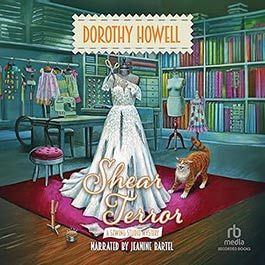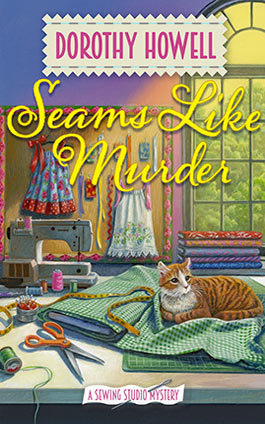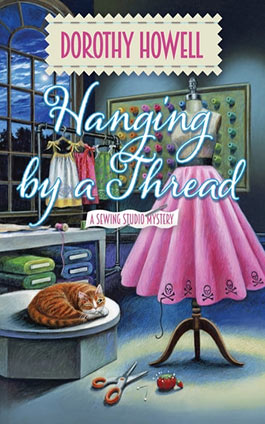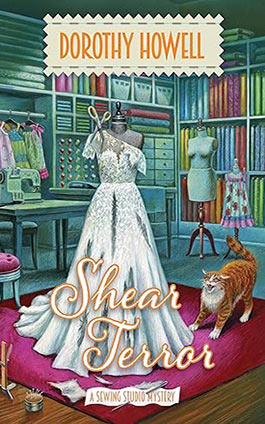Shear Terror, A Sewing Studio Mystery
In small-town Hideaway Grove, California, newcomer Abbey Chandler’s sewing prowess is inspiring her entrepreneurial spirit—but stumbling upon a murder might kill more than her enthusiasm . . .
Abbey’s life in Hideaway Grove is comfortable, and she’s grateful for her small sewing studio in the back room of her aunt’s bakery, but she’s feeling stuck. Her plan to expand her custom tote bag business by selling to a chain of gift shops has hit a snag. Making enough totes to distribute to all the stores requires large-scale production—which requires money Abbey doesn’t have. To make ends meet, she takes a part-time job at the town’s bustling Visitor Center . . .
Abbey is soon sorting items with her co-workers for the Visitor Center’s annual Lost and Found Day when unclaimed items are displayed and offered for sale. Thanks to tourism, there’s enough to fill a huge stockroom. But something is amiss. Eleanor Franklin, devoted to all things Hideaway Grove, hasn’t shown up for work—and when Abbey discovers her whereabouts, it isn’t pretty . . .
Eleanor is dead inside a clothing bin, dressmaker shears impaled in her chest—shears the sheriff reports are engraved with Abbey’s name. Under suspicion, Abbey will have to launch her own investigation. But who would want to kill thoughtful Eleanor, a model resident always so full of good advice about how to uphold Hideaway Grove’s high standards? As it turns out, not everyone appreciated Eleanor’s advice . . .
Now Abbey will have to cut through a tattered trail of greed, theft, and revenge to sew up the case before a killer cramps her style—for good . . .
The Sewing Studio Series in order:
Like a lot of things I’d found myself doing lately, this had seemed like a good idea at the time.
I shivered as I took another sip from the travel cup I carried. Tomato juice. Yuck.
Few people were out this early in the morning as I walked down Main Street in Hideaway Grove, the touristy town I’d moved to not long ago—something else that had seemed like a good idea at the time. My life in Los Angeles had fallen apart so I’d retreated to Hideaway Grove, where, as a child, I’d spent idyllic summers with my aunt while my university-professor parents traveled to the far recesses of the planet doing research.
Hideaway Grove, with its pastel-colored storefronts and blooming flower boxes, drew tourists from far and wide to enjoy the specialty and antique shops, art galleries, and restaurants. The town had been founded by a birdwatcher, so most of the streets and businesses were named after birds. It was a small, close-knit community, where most everyone knew each other and supported the common goal of welcoming tourists and conventions to keep the town’s businesses solvent.
I took another sip of my tomato juice and cringed. Around me, the stores were opening for the day. Merchants swept the sidewalk, set out water bowls for our four-legged guests and chalkboards announcing the day’s sale items.
My aunt Sarah had welcomed me when I’d left Los Angeles, allowing me to take up residence in the bedroom I’d lived in as a child. Her home was just off Main Street on Hummingbird Lane. Aunt Sarah had never married and had no children, so she was glad for the company.
I was glad, too. The only problem I’d run into so far was that her dryer had shrunk my jeans. Not much. Really. A tiny bit. Hardly noticeable.
Okay, actually, Aunt Sarah’s dryer hadn’t shrunk my jeans. It was Aunt Sarah’s bakery.
When I’d pulled on my favorite jeans this morning and found myself engaged in a tug-of-war between the waistband button and the buttonhole—while enjoying a blueberry muffin, one of Aunt Sarah’s specialties—I’d realized I had to face the truth. I couldn’t blame the bakery. It was all me. I had to take action. The best way to do that, of course, was a Google search.
With only a few taps on my cell phone I’d learned that I should be eating and drinking, or avoiding, antioxidants, gluten, processed meats, refined sugars, and a whole list of other things. Not being clear on exactly what all of that meant, I’d grabbed the bottle of tomato juice from the fridge, filled a travel cup I’d found in the cupboard, and left the house feeling pretty darn good about my healthy choice, even though it tasted yucky.
Just ahead on Main Street was Sarah’s Sweets, the bakery my aunt had owned for as long as I could remember, where she turned out delicious and exquisitely handcrafted baked goods. She’d been inside for hours now, baking muffins for early-morning customers and filling the day’s orders. I helped out when needed which had led to a lot of sampling, tasting, just trying a quick bite of—well, too many things, as the waistband of my jeans had told me.
“Abbey!”
That’s me. Abbey Chandler. And the person on the sidewalk ahead of me calling my name was Brooke Collins.
I don’t like her.
“You’re up early,” Brooke declared, her ever-present fake smile plastered firmly in place.
Brooke had on yoga togs, which she constantly wore even when she wasn’t going to a workout class. She was about my age—I’m twenty-four—and she dressed that way to show off her perfect figure.
I forced myself to take another gulp of tomato juice.
She gestured at my travel cup. “Did you stop by the new smoothie shop?”
No way was I getting into the issue of my shrinking pants.
“Mineral water,” I said.
“Well, of course,” she said. “That smoothie shop is awfully expensive … for some people.”
Brooke was married to a dentist. They had a young daughter and lived in a newer, upscale tract of homes just outside of town. I’d heard the place was gorgeous. I didn’t know; she’d never invited me to her house.
“Got to run,” I said.
“That’s right. I heard. You’re working at the visitor center now.”
Another thing about Hideaway Grove was that news, gossip, and even the tiniest whisper of a scandal traveled at the speed of light.
Brooke’s smile vacillated between patronization and pity. “Look at you, working a real job. Isn’t that sweet.”
“Catch you later,” I said, and hoped it wouldn’t happen, as I walked away.
“Abbey!”
I huffed to hold in my annoyance and turned back to face her.
“I wanted to let you know,” Brooke announced. “We’re renewing our vows.”
I supposed she meant her wedding vows. I’d never met her husband. I didn’t even know his name.
“Our anniversary is coming up, so we’re planning something fantastic,” Brooke declared.
Okay, so maybe I’d finally get invited to her house.
“I might need you to do some minor alterations on the gowns,” Brooke said.
What had I been thinking?
“Nothing big,” Brooke added quickly. “I know your sewing skills need a lot of improvement.”
Just as I was seriously considering popping the lid off my travel cup and dousing her with tomato juice, Brooke gave me a little finger wave and hurried away.
I headed down Main Street again, thoroughly annoyed—partly because I hadn’t been able to wear my favorite jeans today and the tomato juice tasted awful—but mostly with Brooke because her assessment of my sewing skills was accurate.
Shortly after moving to Hideaway Grove, I’d found myself heading up a charity project making pillowcase dresses for girls in Africa. At the time, my sewing skills were pretty much nonexistent. I’d converted the storage room in Aunt Sarah’s bakery into a sewing studio, invited women to join the project, and it had turned out to be a fun, productive time for everyone involved.
My sewing skills had improved a little, and I’d become known in Hideaway Grove for my willingness to help with whatever sewing projects needed to be done. Since few people owned a sewing machine these days, I was happy to do minor alterations or repairs. Still, I definitely wouldn’t be auditioning for Project Runway any time soon.
Along the way, I’d learned to operate a beast of an embroidery machine and had started making tote bags that featured the town’s much-loved symbol, the owl, along with cute, clever captions, to sell to tourists at Hideaway Grove’s many events and in some of the shops in town. Thanks to my business degree—my one act of rebellion against my academic parents—and with visions of grandeur, I’d then decided to start my own company selling the totes.
All I can say is that it seemed like a good idea at the time.
Main Street dead-ended at the government center. City hall, the courts, the library, the sheriff’s station, and other offices were housed there, alongside a hotel and conference center. Stretched out in front of the buildings was the village green, with picnic tables, playground equipment, and a bandstand, where many of Hideaway Grove’s civic events took place.
The visitor center, my destination this morning, was also in the complex, situated on the left. The visitor center and the hotel and conference center bracketed the government offices. I’d gotten a part-time job there a few weeks ago—which says something about the tote bag business I’d started—and now spent a portion of my days answering phones, giving tours to site committees, assisting tourists who were lost or had lost something, and just about anything else that needed to be done.
The visitor center wasn’t open for business yet, so I circled to the rear of the complex where a large lot provided parking and space for deliveries. Even back here, Hideaway Grove’s welcoming vibe continued, with shrubs, flowers, and shade trees.
No cars were parked near the visitor center. The rest of the lot was pretty crowded, thanks to the offices in the complex that were already open. In the back corner, a trash truck lumbered toward the line of Dumpsters. Cars and trucks roamed the aisles hoping for an up-close parking space. Men and women dressed in suits, armed with briefcases and messenger bags, flowed in and out of buildings alongside folks there to conduct routine business, some of them wrangling small children.
The back door of the visitor center was closed, which surprised me. I was further surprised when I grasped the knob and realized it was locked. The big roll-up door off to my left was also closed.
While I was always on time for work, I was seldom the first to arrive. That distinction went to Eleanor Franklin.
I glanced around thinking I might see her approaching, saving me the trouble of digging the keys from the depths of my tote, but didn’t spot her. I blew out a heavy breath and mumbled, “Of all the days for her to be late.”
I’d worked a number of jobs throughout my high school and college years, and I’d gotten my dream position with a prestigious marketing company in Los Angeles—which had turned into a nightmare—and I’d found that there was always someone who made it their mission to be the first to arrive. Maybe to impress the boss, get coffee while it was fresh, or go through everyone else’s desk. Who knew? But there was always someone. The someone at this job was Eleanor.
She was in her sixties, a widow, and most of her family lived elsewhere, so she focused her time and effort on the many civic and charity projects she worked or volunteered for. I’d found her friendly and helpful—always nice when you’re new at a job.
Digging for my keys, I scrounged to the bottom of my tote, over, under, and around way too much stuff. The lid popped off my travel cup and tomato juice sloshed onto my hand.
“Great …” I grumbled.
With one last determined dive, I located my keys at the bottom of my tote, unlocked the door, and went inside.
This back area of the visitor center was a huge storage space, sort of like a multi-car garage, off-limits to everyone but employees. It held the tents we used for vendor events in the village green, dozens of white folding chairs, decorations for every holiday and season, and tons of other stuff. The place was so crowded, in fact, that trails had been created through the clutter to get from the front to the back of the room.
Adding to the chaos were giant cardboard boxes, the kind clothing manufacturers used to ship their merchandise from the factory. Since we weren’t shipping anything in them, the lids had been cut off. They were huge, about five feet square, and four feet deep. Attempting to reach the bottom could easily result in falling in, headfirst.
All the boxes were full. They held items that had been found in town and turned in to the visitor center over the past year. Today, we’d begin sorting through the contents, organizing everything for the upcoming Lost and Found Day.
I wound my way to the employees’ tiny bathroom at the other end of the room situated next to what passed for our break area; really, just a fridge, microwave, and a table and four chairs set up in a corner. In the bathroom, I flipped on the light and dumped the rest of the tomato juice down the drain and dropped the travel cup into the sink.
“Oh, my God, you’re bleeding!” someone screamed.
I glanced over my shoulder and saw Paige Easton wide-eyed and panicked, standing behind me, outside the bathroom doorway. I hadn’t seen her when I walked in so she must have been just minutes behind me. Paige had recently graduated high school. This was her first job.
“Oh, my God. You’re bleeding! Oh my God!” Paige yanked her handbag off her shoulder. “Don’t worry! I’ll call nine-one-one!”
I realized then that she’d seen the tomato juice covering my hand that had now seeped over my wrist and forearm.
“It’s not blood,” I said. “It’s nothing.”
“Lie down!” She frantically scrounged through her bag, presumably looking for her cell phone.
Paige was planning to be a dental hygienist.
“No! Don’t lie down! Sit up! And put your feet up!”
Fortunately, not an emergency room tech.
“I’m fine.” I rinsed off the tomato juice and held up my arm. “See?”
Paige yanked her phone from her bag and held it up triumphantly.
“Look, Paige,” I said, raising my arm higher. “Nothing’s wrong.”
Paige stared and panted, looking back and forth from my arm to my face. Finally, she plastered her palms against her chest and heaved a huge sigh.
“Oh my God. You scared me,” she declared. “I mean, you really scared me.”
“I’m okay,” I assured her yet again.
Paige remained near the doorway watching me as if she feared some serious illness might yet befall me, still on alert, still clutching her phone.
“Maybe you should go have some coffee, or something,” I suggested, nodding toward the break area.
“I can stay. I think I should stay. Just in case. Don’t you think?”
“No. Go. I’m fine.”
Paige lingered another moment until I gave her the most reassuring go-ahead head bob I could muster, then walked away. I rinsed the last of the juice out of my travel cup, dried it and my hands with paper towels, and shoved the cup into my tote.
“Where’s Eleanor?” Paige called.
“She’s not here yet,” I said, as I walked out of the bathroom.
“That’s weird,” Paige said, standing beside the fridge. “Who else is working today?”
“Me. And I’m not weird,” Kendall called as she made her way through the trail of clutter and joined us.
Kendall was tall and dark haired like me, making us bookends of a sort for Paige, who was blond and petite. Kendall was about my age, though she seemed older, as if her life had already been weighed down by too many I’ve-seen-it-all experiences.
“Eleanor isn’t here,” Paige told her.
“Okay, that’s weird, all right,” Kendall agreed. “I don’t suppose Miss I’m Better Than You decided to grace us with an appearance today.”
“You mean Gloria?” I asked, though I was pretty sure I already knew.
“Who else?” Kendall retorted. “You know how she is with that attitude of hers.”
I understood Kendall’s comment. Gloria Marsh often rubbed her the wrong way.
“She’s not here yet,” I said.
“She’s supposed to be here today,” Paige added. “She’s on the schedule.”
Kendall waved toward the rows of cardboard boxes. “I don’t know why we have to do this,” she groused.
“It’s for Lost and Found Day,” Paige said, sounding like her usual perky self. “One of the best days for Hideaway Grove’s residents.”
“I say, if the tourists that show up all year long haven’t got sense enough to keep up with their stuff, then too bad for them,” Kendall said.
Part of our job at the visitor center was to make every conceivable effort imaginable to find the rightful owner for each item turned in and return it. When all efforts proved unsuccessful, the item was earmarked for Lost and Found Day. Once a year everything was put on display and offered for sale at ridiculously low prices to the residents of Hideaway Grove, and anyone else who happened to be in town that day.
Before the sale could take place, all the recovered goods had to be sorted, cataloged, and priced. Today, we were working on clothing. We still had to tackle electronics, cameras, totes, handbags, wallets, jewelry, backpacks, and who knew what else.
Kendall frowned at the boxes, as if collecting her mental energy, then said, “Let’s get going so we can get finished. I’ll get the tables.”
She headed for the stacks of folding banquet tables we used to sort the items on.
“Meet you in the middle,” I said to Paige.
I went to the box at one end of the first row; she went to the opposite end.
Paige paused in front of her box. “I wonder why Eleanor isn’t here. Do you think she’s sick?”
“Be nicer if she’d been out late last night partying and was too hung over to get here on time,” Kendall said, as she wrestled a table off the stack.
Honestly, I agreed with her. From what I knew, Eleanor’s life was quiet, sedate, conservative. She might enjoy a night of kicking up her heels.
“Maybe I should call her,” Paige said.
“Suit yourself,” Kendall told her.
“I should call her,” Paige said. “Don’t you think?”
The box in front of me was filled to the top with jackets, coats, and sweaters. I leaned in and scooped up the top layer of clothing with both hands. I froze.
“Abbey?” Paige asked.
I stared into the box and gasped.
“Abbey, don’t you think I should call Eleanor?” Paige asked again.
“Don’t bother,” I managed to say.
Inside the box, amid the jumble of clothing lay Eleanor Franklin, a giant red stain on the front of her shirt, a metal spike in her chest, her eyes open but seeing nothing. Dead. Not just dead. Murdered.








